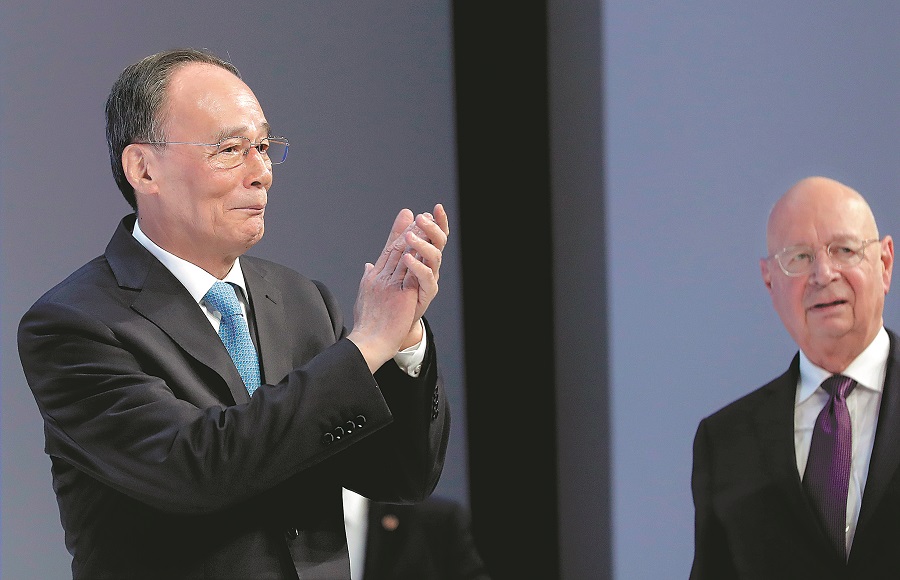Global vision presented in Davos speech


Observers echo VP’s call on innovation, multilateralism, shaping shared future
Vice-President Wang Qishan’s speech on Wednesday at the 2019 annual meeting of the World Economic Forum in Davos, Switzerland, was well received.
Wang called on countries to work together in the age of the Fourth Industrial Revolution with the vision of creating a better future for all of mankind. The event was chaired by Klaus Schwab, the WEF’s founder and executive chairman.
He also called for efforts to uphold multilateralism and jointly build a system of rules for technology as well as a new international cooperation framework based on peace, security, democracy, transparency, inclusiveness, and mutual benefit so that all people can gain from technological innovation.
Wang said it is imperative to respect national sovereignty, refrain from seeking technological hegemony and not interfere in other countries’ domestic affairs.
He also called for accommodating in a balanced manner the interests of all countries, especially emerging market and developing countries. “One should not ask the whole world to address only the security concerns — and comply only with the standards — of developed countries or individual nations,” Wang said.
Foreign Ministry spokeswoman Hua Chunying said on Thursday in Beijing that China always firmly supports, defends and pursues multilateralism.
It will continue to work with the international community to uphold a vision of global governance featuring consultation, cooperation, and benefits for all, and supports multilateralism based on rules and the building of an open world economy as well as a community of a shared future for mankind, Hua said.
It has been proved that the Belt and Road Initiative has brought concrete benefits to countries along the route, she said, adding that she believes that with construction proceeding steadily, it will make greater contributions to promoting global cooperation and common development.
Peter Wilkinson, senior vice-president for regulatory and public affairs at Manulife Financial Corp in Canada, said: “I thought Vice-President Wang Qishan’s speech was very interesting. It was a real mix of history, philosophy and economics, and geopolitical understanding.”
He described Wang as having “great confidence in the Chinese economy going forward” and added that “China wants to be part of the global community”.
More than 3,000 government and business leaders are attending this year’s annual meeting from Tuesday to Friday under the theme “Globalization 4.0: Shaping a Global Architecture in the Age of the Fourth Industrial Revolution”.
Emily Carter, dean of the School of Engineering and Applied Science at Princeton University, said she was happy to hear that Wang, like many people in the United States, recognizes that China and the US are very much intertwined. “And I think that’s a good thing,” she said of bilateral relations. “Exchanges between the two countries, both in terms of goods and people, are good for both sides,” she said.
Carter said she has trained and educated many Chinese students. “I feel really good about that.”
Charles-Edouard Bouee, Global CEO of Roland Berger consultancy, said: “I agree with the vice-president that globalization is an unstoppable trend and the only way forward. Yet, it’s not an easy road.”
Echoing Wang’s speech on globalization, Bouee said that China has been paying more attention to further opening-up and participation in global governance. “China is more willing to resolve disputes through multilateral consultation mechanisms which are internationally accepted.”
Nicolas Barre, editor-in-chief of French newspaper Les Echos, said Wang “projected an image of great confidence of where the country is headed in the long term in a period when people are talking about the next crises”.
“It was interesting to hear that he was explaining that crises are not necessarily tragedies, but could be opportunities,” he added. “For that reason, it was interesting to have another point of view, more optimistic than we hear elsewhere.”
Zhou Jin contributed to this story.




































